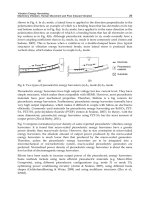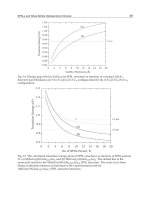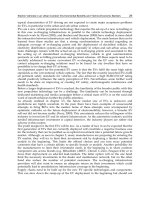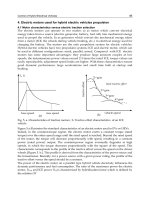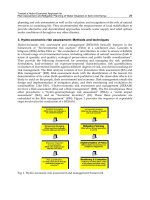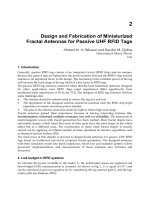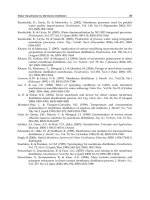Instrumentation Symbols And identification Part 3 ppt
Bạn đang xem bản rút gọn của tài liệu. Xem và tải ngay bản đầy đủ của tài liệu tại đây (81.12 KB, 1 trang )
ANSI/ISA-5.1-1984 (R 1992) 15
4.2.6 A multiple function device may be symbolized on a diagram by as many bubbles as there
are measured variables, outputs, and/or functions. Thus, a temperature controller with a switch
may be identified by two tangent bubbles — one inscribed TIC-3 and one inscribed TSH-3. The
instrument would be designated TIC/TSH-3 for all uses in writing or reference. If desired, however,
the abbreviation TIC-3 may serve for general identification or for purchasing, while TSH-3 may be
used for electric circuit diagrams.
4.2.7 The number of functional letters grouped for one instrument should be kept to a minimum
according to the judgment of the user. The total number of letters within one group should not
exceed four. The number within a group may be kept to a minimum by:
1) Arranging the functional letters into subgroups. This practice is described in Section
4.2.6 for instruments having more than one measured variable or input, but it may
also be used for other instruments.
2) Omitting the I (indicate) if an instrument both indicates and records the same
measured variable.
4.2.8 All letters of the functional identification are uppercase.
4.3 Loop identification
4.3.1 The loop identification consists of a first-letter and a number. Each instrument within a loop
has assigned to it the same loop number and, in the case of parallel numbering, the same first-
letter. Each instrument loop has a unique loop identification. An instrument common to two or
more loops should carry the identification of the loop which is considered predominant.
4.3.2 Loop numbering may be parallel or serial. Parallel numbering involves starting a numerical
sequence for each new first-letter, e.g., TIC-100, FRC-100, LIC-100, AI-100, etc. Serial numbering
involves using a single sequence of numbers for a project or for large sections of a project, regard-
less of the first-letter of the loop identification, e.g., TIC-100, FRC-101, LIC-102, Al-103, etc. A
loop numbering sequence may begin with 1 or any other convenient number, such as 001, 301 or
1201. The number may incorporate coded information; however, simplicity is recommended.
4.3.3 If a given loop has more than one instrument with the same functional identification, a suffix
may be appended to the loop number, e.g., FV-2A, FV-2B, FV-2C, etc., or TE-25-1, TE-25-2, etc.
However, it may be more convenient or logical in a given instance to designate a pair of flow
transmitters, for example, as FT-2 and FT-3 instead of FT-2A and FT-2B. The suffixes may be
applied according to the following guidelines:
1) An uppercase suffix letter should be used, i.e., A, B, C, etc.
2) For an instrument such as a multipoint temperature recorder that prints numbers for
point identification, the primary elements may be numbered TE-25-1, TE-25-2, TE-
25-3, etc., corresponding to the point identification number.
3) Further subdivisions of a loop may be designated by serially alternating suffix letters
and numbers. (See Section 6.9R(3).)
4.3.4 An instrument that performs two or more functions may be designated by all of its functions.
For example, a flow recorder FR-2 with a pressure pen PR-4 may be designated FR-2/PR-4. A
two-pen pressure recorder may be PR-7/8, and a common annunciator window for high and low
temperature alarms may be TAHL-21. Note that the slash is not necessary when distinctly separate
devices are not present.
4.3.5 Instrument accessories such as purge meters, air sets, and seal pots that are not explicitly
shown on a diagram but that need a designation for other purposes should be tagged individually
